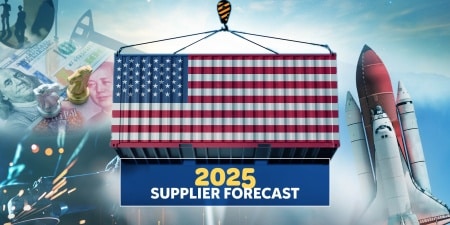By Steve Guglielmo and Brian Beaulieu
ITR Economics CEO Brian Beaulieu is GAWDA’s Chief Economist. He and his team of economists produce the ITR Quarterly Report for each issue of Welding & Gases Today. Brian also gives a presentation at the GAWDA Annual Convention each year. ITR produces an annual webinar describing how to use the data in the ITR Quarterly Report. GAWDA members can access this webinar on the GAWDA.org members section. This year, Brian was kind enough to discuss a wide-ranging of topics with Welding & Gases Today, including his expectation for the economy going forward, his take on the looming presidential election and its impact on the economy and how GAWDA members can use the ITR data in their strategic planning. For more insight on how GAWDA members can use that data in their planning, please check out the roundtable article on page 84. Thank you to Brian for your help in putting this article together.
Welding & Gases Today: What is your overarching message to GAWDA Members on the state of the economy as we enter 2020?
Brian Beaulieu: The slowdown that we’re currently experiencing is already abating. It won’t be over until we get through 1Q or maybe even 2Q 2020, but the leading indicators that we follow, more and more of them are turning up. We surpassed the demarcation point of five leading indicators turning up a couple of weeks ago (in November 2019), so we are good to go for this economy turning up in the second half of 2020.
WGT: In your experience, how does the gases and welding industry correlate with the overall U.S. and world economies?
BB: The gases and welding distributors, if we’re talking about the ones who are associated with manufacturing or fabricated metals or just industrial welding, they will tie in very well with U.S. industrial activity and world industrial production for that matter. So they will be feeling the affects of what we’re talking about very directly. But some folks are more tied to ship building. And ship building is a totally different animal. It’s on its own cycle. Then there are those who are tied to the aircraft industry. And the aircraft industry is very much a function of what’s going on with oil prices. Oil prices being soft makes that a different ballgame.
WGT: So it depends on what your core competencies are, how closely it correlates?
BB: Yes.
WGT: You produce a very comprehensive report for GAWDA each quarter, it’s 12 pages in the magazine. How do you think that GAWDA members should be utilizing those reports in their strategic planning?
BB: They should be looking at, stopping and thinking if not actually crunching the numbers, “Is my business performing like any of the data points that ITR is providing through these quarterly reports?” If the answer comes back as yes, then take that outlook or those outlooks and say, “Ok, assuming that’s me and I’m going to be getting busier, what will I need more of in order to handle that additional business in the second half of 2020 and on into 2021?” Start asking yourself those questions. That’s more tactical. The strategic part of it comes from, “Well, I don’t like going through slowdowns. I don’t like going through downturns. ITR has a downturn in the outlook for 2022 and 2023. I don’t want to experience that. How can I strategize today to avoid going through that downturn?”
WGT: Is there a way that members can take that big picture macro outlook and extrapolate that down to their individual businesses. So that they can almost make their own indicators for their own companies?
BB: I don’t mean this to be self-serving, but we developed a subscription service called Data Cast, and you can learn about that right on our website. We created it for that specific reason. Some companies pay us to do the work for them and to come up with quantitative forecasts. But if they want to do it themselves, if it’s a DIY situation, that’s fine too. Using Data Cast, you load in your company data, you can load in divisional data. Any way you want to look at it. And we have about 9,000 different data series that you can run that data against. Chances are, we have something that you relate to, logically. Just start off with U.S. Industrial activity, GDP, Fabricated Metals Production, etc. The computer will look for the high correlation values for you and you’ll start cherry-picking off the high-correlation values but some of what is logically related to you, won’t even be the high-correlation ones. You’ll go in and say let me look at each of the series that ITR is currently providing in the quarterly reports and what they’re showing us at the Annual Convention. That’s what I would do.
WGT: Stop me if you’ve heard this before, but the USMCA is on the “one yard line.” I think it’s closer to being passed than it has been previously and there is supposedly a phase one deal with China. If both of those things come to pass and are actually encoded into law, does that impact your projection for next year or going forward?
BB: No. And here’s why. The USMCA isn’t going to have a big impact on the economy. We’ve already got workarounds in place. And it’s an improvement over NAFTA, but we know what NAFTA was like and how that impacted things. So no, that won’t have a material impact on our forecasts. It may help some individual businesses, but when you talk about the macroeconomic level, no it won’t have an impact. Vis a vis China not imposing additional tariffs would be helpful. Imposing additional tariffs would probably be detrimental to our forecast. Exactly how much, we would have sit down and measure. So, I guess, if anything, the forecast assumes things aren’t going to get worse with China. We’ve been down this road so many times with this administration, they say we’re about to conclude something and then the Chinese say, “No we’re not.” And then the Chinese say we’re about to conclude something and the administration says “No we’re not.” So it’s hard to know what to actually believe.
WGT: So until there is actually pen to paper, we’re going to assume status quo?
BB: Correct.
WGT: We’ve discussed this at length before, but just to reiterate, you do not expect the winner of the 2020 Presidential Election to have a material impact on your forecasts going forward unless there is a corresponding change in Congress?
BB: Yes. And that’s only if that Congress is willing to go along with any significant change in agenda, as well. What we all presume will happen in the Congress is that more Democrats will get elected, but if there is still a check and balance with the White House, then absolutely nothing will change. And even if we were to get a Democrat in the Oval Office and a Democratic Congress through and through, nothing much is going to change for 2021. Anything they’re going to do is going to impact 2022, not 2021. And we’ll have plenty of time to figure that out. We plan scenarios all the time here. I’m not coming up with anything that will make me feel better about 2022 and 23. I can come up with some scenarios that make me feel worse about it, but not better.
WGT: You’ve cited a statistic before about the average rate of growth with a Republican in office versus a Democrat and how they’re virtually identical. What was that statistic again?
BB: Since 1976, when a Republican is in the Oval Office the economy grows at an average rate of 2.81%. When there is a Democrat it’s 2.85%.
WGT: So all of the hysterics about the election are overblown?
BB: Yes. It’s the Pareto Principle. People are so caught up in the 80% of stuff that doesn’t matter. In my life, I try to just look at the 20% of stuff that does matter. And it makes life a lot better.
WGT: There is so much noise to sift through, determining what that 20% is has got to be a lot harder today than ever before.
BB: I guess. Although, we understand what ultimately drives the economy and it isn’t this morning’s trending Twitter topic. It isn’t a temporary gyration in the stock market. That makes life a little bit easier.
WGT: If you were in an elevator with a GAWDA member and they asked you to give one piece of advice going forward, you only have time for one answer, what would you say?
BB: I would tell that person, be bullish on America for the next ten years. I would tell that person to invest heavily in yourself and your business. I would look for ways to automate. Use technology to gain an edge over your competition. And if you’re just confident over the long run instead of being afraid over the long run and you’re willing to invest in your entrepreneurial self, you’re going to really enjoy the next ten years. And I know there are going to be business cycles. I’m not saying there won’t be business cycles, there will be, and I know there is 2022 and 23, but don’t be paralyzed by fear. Become and economic marine. Figure out how you’re going to overcome with what you have available to you.









